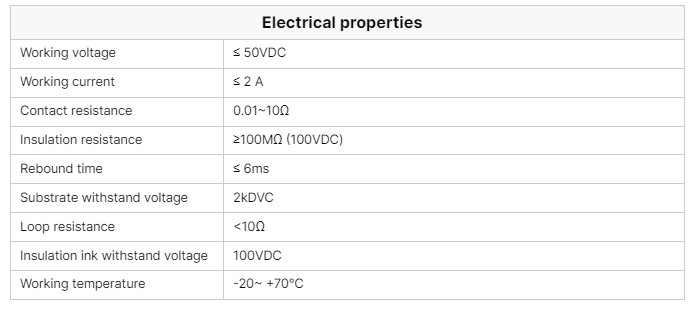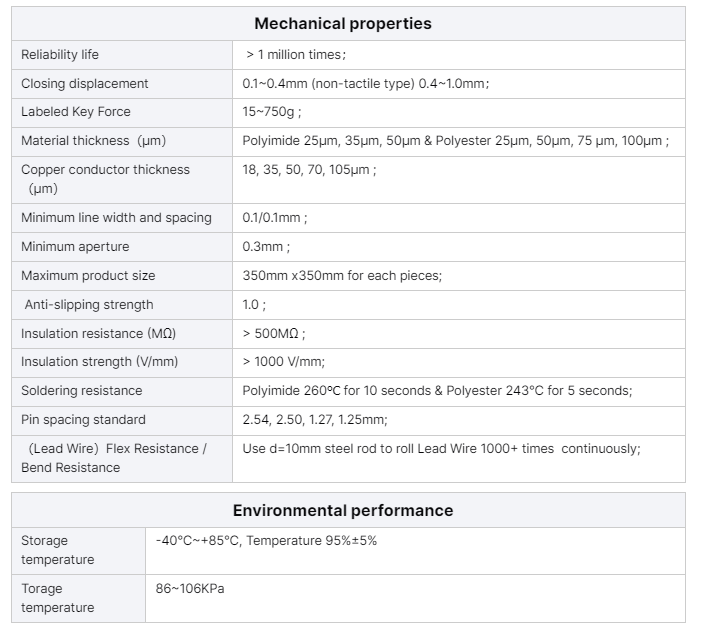
Contact Us
What is FPC Membrane Switch and Its Benefits?
FPC (Flexible Printed Circuit) membrane switch is a thin, lightweight and Flexible membrane switch with FPC interface connector that combines the functionality of traditional switches with the flexibility of printed electronics.
FPC membrane switches are widely used in household appliances, CNC machines, industrial equipment, and various electronic & medical devices where space-saving and durability are crucial.
What is FPC Membrane Switches for?
FPC membrane switch is made of PET/PC panel with 0.1/0.125 FPC circuit, back with adhesive tape. Also, it contains Terminal/Connector/Metal Spring Tab/LED.
And it plays a crucial role in electronic products for High sensitive buttons and a comfortable touch, offers stable current and signal transmission to devices. Adopt a waterproof design, prevent liquid from penetrating into the inside of the switch and improve the waterproof performance of the product.
What Is The FPC Membrane Switches Used For?
1. Consumer Electronics :
Smart home controls (thermostats, security panels, lighting systems)
Handheld devices (remote controls, gaming controllers, VR headsets)
Portable electronics (digital cameras, audio players, e-readers)
Wearable devices (fitness trackers, smartwatch side buttons)
FPC membrane switch is used for buttons, touch panels or flexible connectors.
Replace traditional mechanical switches, reduce device thickness, and improve waterproof and dust-proof performance.
How it works: By pressing the top film (usually PET) to make the two conductive layers touch, triggering the circuit signal.
2. Industrial & CNC Equipment:
Machine control panels (CNC mills, lathes, 3D printers)
HMI interfaces (process control systems, PLC operator terminals)
Test & measurement equipment (oscilloscopes, multimeters)
Factory automation (robotic arm controls, conveyor systems)
FPC membrane switch is used for control interfaces in harsh environments (oil-proof, chemical-resistant, and vibration-resistant).
Simplify mechanical structure and reduce failure rate.
How it works: Thick film printing technology is used to enhance durability, and elastic pads (such as silicone) are used to provide tactile feedback.
3. Medical Devices:
Diagnostic equipment (ultrasound machines, blood analyzers)
Patient monitors (ECG, pulse oximetry controls)
Surgical tools (endoscope controls, electrosurgical units)
Portable medical devices (infusion pumps, ventilators)
FPC membrane switch is used for providing a sealed interface to prevent liquid penetration (IP67/IP68 compliant). Easy to sterilize (smooth surface without gaps).
How it works: Use medical-grade materials (such as antimicrobial coatings) to avoid mechanical wear and tear by using a light touch trigger signal.
4. Automotive & Transportation:
Dashboard clusters (infotainment, climate control)
Steering wheel controls (audio, cruise control)
EV charging stations
Aircraft cockpit panels (auxiliary controls)
Used for in-car control panels (air conditioning, window buttons), adapting to a wide temperature range (-40℃~85℃). Reduce weight and adapt to curved surface designs (such as touch screens on car displays).
How it works: Combined with pressure sensing or capacitance technology, some high-end models use multi- layer FPC to achieve multi-functional integration.
Advantages of Using FPC Membrane Switches
① Flexibility: The switch is made of flexible circuit boards, which have good flexibility and bending properties and can adapt to various curved and curved surfaces.
② Thin: Save product space and particularly suitable for embedded devices and small electronic products.
③ Lightweight: The switch is made of lightweight materials, with a light overall weight, and will not bring a weight burden to the product.
④ Good durability: Many times for pressing operations without failure.
⑤Sensitivity: High sensitivity and a comfortable touch, and users can easily sense the triggering of the keys.
⑥ Good electrical performance: Provides stable current and signal transmission.
⑦Waterproof: Adopt a waterproof design, prevent liquid from penetrating into the inside of the switch and improve the waterproof performance of the product.

